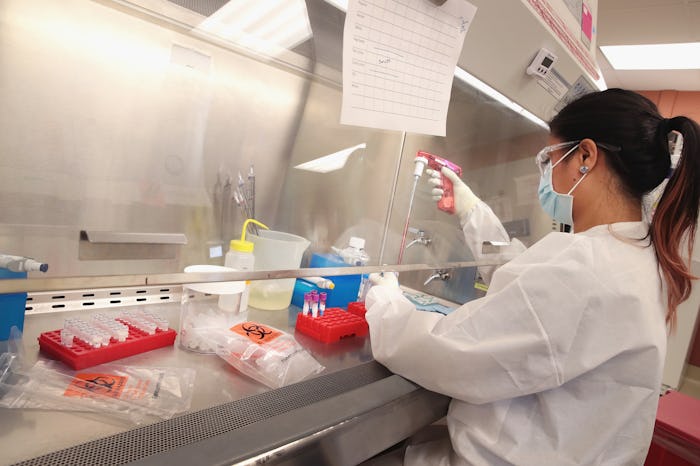Life

What Do The Zika Vaccine Trials Consist Of? They're Offering Hope For Real Prevention
Besides of its rapid spread across the Americas, one of the most concerning aspects of the mosquito-borne Zika virus is that, for people in infected areas, there's no truly reliable way to prevent it. As thousands of babies have been born with severe Zika-related birth defects and there has even been a rash of locally transmitted cases in the United States, researchers are continuing to search for solutions to control and stave off the illness. A series of promising experiments are offering hope that officials will get the sickness under control, and the various Zika vaccine trials consist of creative, bold potential answers to a problem that has been plaguing the United States' southern neighbors most arduously.
Zika funding has been a contentious political issue in the United States for months. Back in February, President Barack Obama requested $1.9 billion from Congress, but the government has not succeeded in passing legislation to allocate the money. One British biotechnology firm has proposed releasing genetically modified mosquitoes into the general population to reduce the number of carriers. The Centers for Disease Control strongly discourages pregnant women from traveling to infected areas, and implores men who have done so to wear condoms during sex, because it also spreads through sexual contact. According to CBS News, Florida alone has reported 616 travel-related and 56 locally transmitted cases of Zika.
Zika is on the radar of many politicians and public health officials, and so are the possible ways to combat it that are currently in development.
Promising Results In Monkeys
In early August, NBC News reported that researchers at Harvard's Beth Israel Hospital and the Walter Reed Army Institute of Research determined that three experimental Zika vaccines they developed were effective in monkeys. This is a good indicator that they'll work well in humans too, and one of them is progressing to clinical trials. Purified inactivated Zika virus, or ZPIV, uses harmless Zika proteins to train the immune system to produce antibodies to attack the live virus, and testing in humans could begin as early as October.
Voluntary Zika Injections
Get this: Researchers are seeking healthy, and definitely non-pregnant, people to submit to being voluntarily injected with the Zika virus in order to study its effects and possible vaccines. According to the Associated Press, there will be two phases to this "human challenge" study, set to take place in a Baltimore hospital during the mosquito-inactive month of December. First, in a controlled environment, scientists can determine how many infected adults truly experience symptoms, how the disease develops, how long it lingers in the body, and how it may react to a vaccine. Then some of the volunteers, all of whom will be compensated, will get a vaccine, followed some months later by another dose of Zika. It's all meant to speed up the process of getting a vaccine to people who need it in the real world.
Clinical Trial Launched In Puerto Rico
Trials for an experimental Zika vaccine are also underway in Puerto Rico, where there have been more than 14,000 cases, the AP reported in late August. In contrast with the administering of a weakened version of the virus to develop a vaccine, as they did with the monkeys over at Harvard, this vaccine is DNA-based. Receiving it will be 160 adult volunteers, and if they show promising results the Pennsylvania-based drug company responsible for the vaccine will meet with regulators next year about developing it.
None of these possible solutions to the rapid spread of the Zika virus are at all ready to actually help the general population. But they're encouraging steps in the right direction, and should make those concerned about the illness hopeful about its demise.